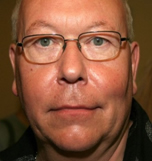
A SHORT BIOGRAPHY
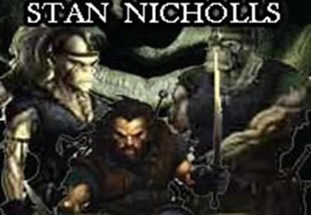
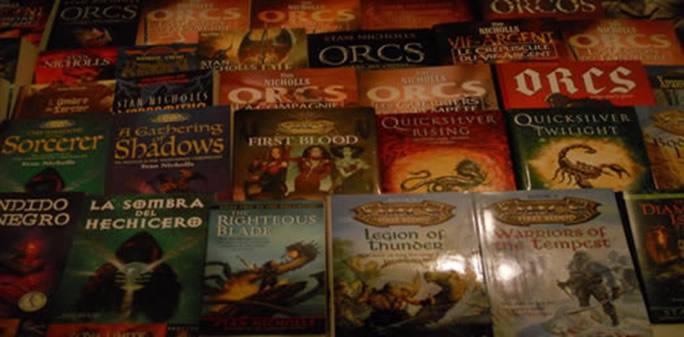
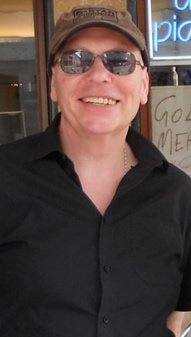
Stan Nicholls is the author of more than thirty books, most of them in the fantasy and science fiction genres, for both adult and young readers. Titles include Strange Invaders, Fade to Black, The Nightshade Chronicles trilogy and Wordsmiths of Wonder: Fifty Interviews With Writers of the Fantastic. He adapted David Gemmell’s Legend and Wolf in Shadow into graphic novel form, novelised TV series Dark Skies, and wrote authorised biographies of, among others, Gerry Anderson of Thunderbirds fame and Coronation Street’s Willam Roache. His Quicksilver trilogy (Dreamtime trilogy in the US) - Quicksilver Rising, Quicksilver Zenith and Quicksilver Twilight - is published in the UK by Voyager/HarperCollins.
Stan’s Orcs: First Blood trilogy - Bodyguard of Lightning, Legion of Thunder and Warriors of the Tempest - published in the UK by Gollancz, is a worldwide bestseller, with over a million copies sold to date. The associated Orcs story ‘The Taking’ was shortlisted for the 2001 British Fantasy Award. The second trilogy, Orcs: Bad Blood, consists of Weapons of Magical Destruction, Army of Shadows and Inferno. Volumes from both trilogies made New York Times bestseller lists. A collection of prequel stories, Orcs: Tales of Maras-Dantia, (NewCon Press) was published in 2015.
The Orcs trilogies have appeared as unexpurgated audiobooks, read by John Lee and published by Tantor Media. An original graphic novel, Orcs: Forged For War, illustrated by Joe Flood, was published in October 2011 by First Second Books in the US, Pan Macmillan in the UK and Les Editions Gallimard in France, and also entered the New York Times bestseller list. It won the 2011 Geek Life Award for Best Comic Book of the Year, and was awarded a Great GN Accolade by Graphic Novel Reporter.
Stan’s books have been published in more than 20 countries, including Argentina, Australia, Brazil, Bulgaria, Canada, China, Czech Republic, France, Germany, Holland, Italy, New Zealand, Poland, Romania, Russia, Spain and the United States.
He has had approximately fifty short stories published in various anthologies and magazines, and a collection, Shake Me To Wake Me, came out from Newcon Press in 2013.
Stan published science fiction and horror fanzines when a teenager, and contributed to many. He has always worked in the world of books. Jobs included a position in the London office of Washington’s Library of Congress; freelance proof-reading and line editing; consultancy and manuscript reading for publishers and literary agents; hosting an online science fiction chat show for the Sony corporation, and acting as Dennis Wheatley’s Research Assistant. He has written copy for the advertising industry and run courses in creative writing and journalism for London’s City University and Westminster Adult Education Institute, among others.
Before taking up writing full-time in 1981, Stan co-owned and managed Notting Hill bookstore Bookends, and was manager of specialist sf bookshop Dark They Were and Golden Eyed. He was the first manager of Forbidden Planet’s original London store, and helped establish and run the New York branch.
A journalist for national and specialist publications, and the Internet, he was for six years the science fiction and fantasy book reviewer for London listings magazine Time Out, and subsequently reviewed popular science titles for the magazine. His journalism has appeared in The Guardian, The Independent, The Times, Film Monthly, Films & Filming, Movie, Rock Power, SFX, Sight & Sound and some seventy other publications. He was a Contributing Editor to The News (later re-titled Fortean Times).
He was the recipient of Le'Fantastique Lifetime Achievement Award for Contributions to Literature, presented at the Trolls & Legendes Festival in Mons, Belgium, 7th-8th April 2007. Stan was Chair of the David Gemmell Awards For Fantasy from their instigation in 2009 until 2019.
Stan is married to psychotherapist and artist Anne Nicholls, formerly Anne Gay, who has written science fiction and fantasy, self-help books and journalism under both names.
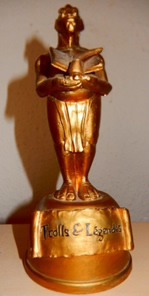
The Trolls & Legends trophy.
Stan Nicholls: Standing Up For Orcs
An Interview by Barry Forshaw
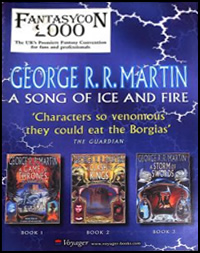
In 2000 I had the privilege of being one of the guests of honour at Fantasycon XXIV. (The other GoHs were Doug Bradley , Storm Constantine and Stephen Lawhead.) The following interview, conducted by Barry Forshaw, appeared in the convention souvenir programme. As I’m refreshing this Biography almost twenty years to the day since the interview appeared, and much of it is still relevant, I thought this would be a good point to revisit it.
Stan Nicholls' career as a writer in the sf and fantasy genre is steaming ahead. Apart from being an indispensable guide to the genre with his column in Time Out magazine (and his book of definitive author interviews, Wordsmiths of Wonder), a leading writer of children's fantasy (such as the highly accomplished Nightshade Chronicles trilogy), a collaborator with such stellar names as David Gemmell (the graphic novel versions of Gemmell's Legend and Wolf in Shadow) and a chronicler of such genre-related creators as Gerry Anderson (whose authorised biography he wrote), Nicholls is gleaning a considerable following for his Orcs: First Blood sequence. The first book, Bodyguard of Lightning, achieved the kind of reviews and sales most fantasy writers would kill for, but Nicholls quickly consolidated his success with volume two, Legion of Thunder, providing more of his highly individual brand of witty and energetic riffs on fantasy themes. With the third book in the sequence, Warriors of the Tempest, pending publication, it seemed a good time to catch up with the prolific Nicholls ...
Barry Forshaw: Your Orcs sequence has acquired a considerable following. How did you come up with the initial concept?
Stan Nicholls: It was an attempt to stand things on their head. The basic premise was simply to take one of fantasy's traditional hate groups, orcs, and cast them as misunderstood heroes. It's not a great step from that to casting humans as villains. But as often happens when you work up an idea, it got more involved. Not all humans are bad in the world of Maras-Dantia, and the orcs aren't exactly unblemished paragons of virtue. Then I hit on the notion of populating this world with lots of fantastic, mythological creatures, which I call the elder races, and giving most of them magical abilities fueled by the land's earth energies. My orcs are one of the few races not to possess magic. A McGuffin is that the incoming humans are “eating” this magic, in other words letting it bleed away, through their increasing destruction of the environment. This interference has screwed-up the climate and sparked an encroaching ice age. So it's a world in decline. Another layer is that the humans are divided among themselves by religion. Roughly speaking, it's pagans versus the newer cult of monotheism. My own view of religion is somewhat sceptical, and not a little confused, but I'm fascinated by the subject and wanted to have a take on it. So all of that was more or less the starting point. The rest is sex, drugs and rock 'n' roll. Though admittedly there isn't a lot of rock 'n' roll.
How difficult is it to sustain a certain level of invention in a sequence such as this?
It's kind of weaving, isn't it? Spinning an idea like candy-floss. Though hopefully it ends up more substantial than that! There really is truth in the old maxim about your characters taking over. I find that once I've got the initial idea outlined, all sorts of possibilities occur. If anything, my 'problem' is too many ideas; too many ways I can see a story going. But I'm not knocking it.
When you're writing, do you avoid other authors' work, or turn to them for inspiration?
This is problematic. If I'm writing a book, I like to avoid reading anybody else's. I think many of us live in dread of unconscious plagiarism. Unless you're careful you can even sponge up someone's style. Another reason to avoid it is the danger of reading somebody so damn good it throws your confidence. But for practical reasons I don't always stick to the ‘don't read while writing' rule. Wearing another hat, I'm the sf and fantasy book reviewer for Time Out, and still review in a couple of other places, and obviously that involves some intense reading. Plus I like it, of course, and can't always resist something new from a favourite writer. Ideally, I'd only read between writing books.
Who are the writers who initially inspired you?
That would be a long list. Almost all of them worked or work in the sf, fantasy and horror fields, but I'd probably cite a couple of comic book writers and one or two screenwriters as well. Getting specific means acknowledging that your tastes develop, and that some of the earlier stuff you read wouldn't necessarily get house room now. But early pleasures were Wells, Howard, Moorcock - who still is - Wyndham, Leiber, Asimov, Clarke, Sheckley, Dick ... And that little coterie of writers who were kind of post-Lovecraftian and came to dominate the American scene in the '50's and '60's; Bloch, Beaumont, Finney, Fredric Brown, Ray Russell and definitely Matheson. My all-time favourite contemporary fantasy author is David Gemmell, whom I've had the pleasure of working with and learnt a lot from, though not stylistically, I think. In the area of crime I've always loved Hammett and Chandler, perhaps predictably, and in the mainstream I was for a long time very partial to Dickens and Conrad. But my first loves, sf and fantasy, remain the most abiding, and there are a lot of very good writers working in these genres now. I don't hold with the view that the field is moribund.
Why do you think the genre gets such a bad press in the mainstream media?
A lot of it gets a very good press, it just isn't called science fiction or fantasy. If you're a mainstream novelist who decides to “borrow” the tropes, chances are you'll be hailed for your originality and foresight, and nobody gets to mention those appallingly vulgar genres. I have to be careful what I say here, but I think Philip K. Dick, Sheckley, Vonnegut, and others I could name, should be getting the credit for a recent spate of so-called mainstream novels by literary big guns that in some cases blatantly rip them off.
Why don't the literati like our genre?
Ignorance, snobbery, stupidity; belonging to a very insular, which is to say very heads up their own arses, group of mostly London based ingrates. They live in an atmosphere that breeds contempt for anything other than 'high' literature, and which sees a book that sells 800 copies to people like themselves as inherently morally superior to one that sells 500,000 to plebs. But mostly they hate fantasy and sf because they've never sucked it. I think it's a bit like Guinness: you have to break through the initial taste. I wouldn't hold your breath waiting for their conversion though.
Do you think that the fantasy and sf genres will ever be treated with the kind of seriousness that is now given to crime writing?
Part of me isn't sure I want it to be. I have some feeling for Iain Banks' contention that science fiction, in particular, belongs in the gutter. If nobody “important” cares what you're doing you can get away with more. Then again, when you're trying to earn a living from this stuff, a little more respect wouldn't go amiss. I also agree with Ballard's comment that science fiction is probably the 20th century's most important literary form. Whether that means it should be universally respected is a moot point.
Do you feel that fantasy books are, on the whole, intelligently marketed?
Perhaps that's a question that should be applied to the marketing of books generally. One of the problems we have today, if you chose to see it as a problem, is that there are so many books being published. The downside is that only limited budgets are available to promote most of them. We've all read excellent books that we just know would do very well if people heard about them. Irrespective of genre, I'd like to see a little more money devoted to promoting newer authors, and what were once called mid-list authors, rather than have it all lavished on the established best-sellers who arguably don't need the boost as much. But it isn't just a question of money. Some of the best promotions are based on thinking creatively about how to bring a book to the publics' attention, and I'd certainly welcome more of that. Effective promotion isn't just a case of advertising. In fact you might argue that simply trying to buy attention is the least efficient way of gaining market share. Of course, word-of-mouth is by far the best marketing device; if you think of the early careers of Douglas Adams, Pratchett, Banks and others you'll see that played an important part. Publishing is something else that's greatly interested me, and that sort of casino aspect is part of the attraction. The practice of throwing thousands of titles into the marketplace in the hope that a handful hit the jackpot may or may not have got out of hand, but there's certainly something heady about it. One of the things I like about the process is the advance against royalties system, which effectively means that author and publisher take a punt together; both parties stand to win or lose, and that feels democratic to me. If I have a criticism about modern publishing, or maybe concern would be a better word, it's this increasing tendency to hand huge advances to new novelists seemingly on the basis that they're 23 years-old, photogenic, preferably live in London and are writing about something publishers imagine will capture the elusive youth market. Too often this ends in modest sales that come nowhere near covering the sums shelled out. Giving unproven writers gigantic advances can actually be bad for them, I think, because it piles on too much pressure to perform too early on. If any publishers happen to be reading this, that doesn't apply to me of course.
It seems to me that writing is a prime example of a craft that benefits from experience and maturity. An editor - not one of mine - was once candid enough to tell me that if he had two manuscripts of equal merit submitted - one from a male in his 40s or 50s with a reasonable track record, the other from a young first-time female who looked fetching - and he could only buy one, he'd go for the newcomer because she'd be easier to sell. Fresh talent must be fostered, but I'd hate to see ageism creeping into publishing the way it has other businesses.
How do you see your work developing?
As I said, I believe writing is something that should get better the more you apply yourself to it, like developing a muscle. So I would hope to learn and improve. It really is a layers of the onion activity - it has endless potential and there's always something new to master, and aspects you can work on to hopefully make better. Like a lot of writers, I'm a kind of sociopath who can't imagine doing anything else, so in a way I've no choice other than trying to be as good at this thing as I can. As to what I write, given the opportunity I guess it'll always be in the area of the speculative and fantastical.
Does the explosion of interest in sf and fantasy - in the cinema, for instance - impact upon your work?
In some ways it does, notwithstanding that most cinema sf and fantasy still lags well behind the literature. The influence of other media is mostly on style and presentation. Films, TV, PC games and the rest have attuned people to a much brisker form of storytelling, and that tends to up the pace at which you unfold your plot. Which is no bad thing, in my opinion. My first seven or eight books were for the young adult market, and I was very conscious that all these other media are vying to attract kids, and that maybe they now have a shorter attention span than ever before. So to some extent you try to accommodate those trends, while not losing sight of the fact that books are a discrete form with their own unique mechanisms.
Do you have any ambitions in the direction of writing non-genre fiction?
I think I've got over my half-formulated ambition to write at least one book in every genre! Just to prove to myself that I could do it, you understand. While that thought dominated I wrote YA science fiction, horror, some humour, a couple of biographies, film and TV tie-ins and a crime novel. Obviously some of them were out of practical necessity and to gain experience and build a profile of sorts. The crime outing, Fade to Black, has done very well and I'm proud of it. It's more or less in the whodunnit mould - I've got that kind of puzzle-solving mentality - and crime fiction is something I wouldn't mind trying again. But I'd incorporate it into a fantasy or sf milieu. I do harbour the ambition to write some pure, solid science fiction, and have several ideas burning a hole in my pocket.
As well as your novels, you are well known as an sf journalist. How do you reconcile the demands of your two professions?
I do a lot less journalism these days, and I'm much more selective about it, because I want to concentrate on authorship and that tends to be all-consuming. Journalism has been a fantastic training ground though. It inspires good habits, like brevity, clarity and a respect for deadlines. The demands of the profession teach you to get on with it. I subscribe to the old journalistic saw that there isn't a story that can't be told in fifty words. These disciplines have been very useful in writing fiction. But journalism can have negative effects too. It can make you a little too sparse and headlong, a tad more minimalist than fiction requires. Journalism's generally a benign influence, but some of its lessons have to be unlearned.
Can you look back on your early unpublished work with affection? Is any of it publishable, or will it remain in a bottom drawer?
I can honestly say that I've never had a great deal of work unpublished. There's some early journalism that got bounced, when I was groping around with both the craft and markets, but very little else. I've never had a book bounced, and only one short story, which I subsequently placed elsewhere. Mind you, most of this is down to only writing to commission. I haven't written anything on spec, except letters to magazines and the like, for about twenty years. I would hope I'm beyond having to now. I've had ideas and proposals for books rejected for various reasons, but that's par for the course.
The vexed question of violence: how do you feel a writer should approach this today?
Vexed is the word. I tend to think that my books, certainly the ones I'm writing now, are filled more with action than violence. But it can be a fine distinction and maybe I'm kidding myself. I'm content to fall back on the old cliché about it being acceptable if it's really essential to the story. I've written plenty of totally non-violent stuff when the subject called for it.
And sexuality? Should a fantasy writer opt for frankness or discretion?
I don't see why you shouldn't be explicit, if it fits. For some reason fantasy is still seen as being allied with younger readers; a heritage of Tolkien perhaps. And although there's a lot of really strong fantasy being written for the youth market, I don't see why there shouldn't be a distinct thread of fantasies for grown-ups. Sexuality's an important part of life, and where appropriate it has its place in fiction.
Do you feel it's possible for a writer, genre or otherwise, these days to be apolitical?
Or does the state of Western society create a political stance, indirect or otherwise?
I've always thought that style was like your fingerprints - something inherent that you could polish but not fundamentally change. A sort of genetic signature. Maybe politics is the same; whatever you believe is going to imprint itself. But that applies equally to your societal views, your ethics, morality, everything. Attitudes probably work in on some level, quite apart from what you might be trying to include consciously. I certainly make choices when I'm writing about characters with diverse views, or situations I have feelings about. But I don't necessarily tell the readers. They can work it out for themselves.
Tell me a little about your working methods.
If you're doing this professionally, you have to have a professional attitude and treat the actual keyboard work as a job. You've got to approach it as a 9-5 thing. Though 9 to midnight more often seems the norm! I used to run Creative Writing and Journalism courses in London in the '80's, and I've attended writers' groups in the past, and one of the things that used to drive me nuts was people who couldn't manage to write 300 words in a week because they hadn't been “kissed by the muse” or some such bollocks. Another bugbear was people coming to practical writing courses and saying, “I don't want to be criticised. My writing is too personal to me.” Keep a fucking diary then. Because you're sure as hell not going to have a wider audience. That sounds cruel, doesn't it? I'm not trying to be unkind, but it really is true that writing is ninety-nine per cent perspiration, and a good proportion of the remaining one per cent is frustration. Which isn't to say there isn't pleasure in it - there is, in huge quantities - but most of it's hard work. The word application can be as important as inspiration, and sadly that's what a lot of aspiring writers lack. How many times have you heard somebody say, “I'm sure I could write a book if I just had the time”? They should try it. This attitude of “writing for myself” or “courting inspiration” is entirely the province of the amateur. For me, writing without the prospect of readers makes the whole exercise redundant. Extrapolating on that, the more readers the better. I think I must be shamelessly commercial.
What do you feel is the principal appeal of the kind of fiction you write?
I try to write what I've always liked to read, and what I want to read but haven't found yet.
The other arts ... Is it important for a writer to be au fait with films? And is music a factor in your inspiration?
I don't think it's necessary to be a film buff to be a writer, unless that's your speciality of course. Having said that, I think there's a sense in which I write some of my stuff in a cinematic way, particularly action sequences. I've always had a fairly visual imagination - if I can see a scene I can make it work.
Music's a factor in my life, and sometimes in what I write. I often play music as I work, and there it's giving a sort of soundtrack, a mood background. Sometimes I tailor the music to what I'm writing. What was I listening to during the orcs books? An eclectic mix, now I come to think of it. Vaughan Williams, bits of Wagner and Rimsky-Korsakov, Gregorian chants, John Williams, Enigma, Clannard, Ladysmith Black Mambazo, blues, reggae, techno, house ... Some terrible old hippie stuff I still have an affection for but won't embarrass myself by naming. Generally atmospheric sounds. I have very catholic tastes in music.
Many people are lucky enough to be able to remember a teacher or mentor who was influential on them. Do you have such a figure?
I remember with crystal clarity walking out of the school gates for the last time and making an oath that no matter how old or nostalgic I got I would never fool myself into thinking that my education was anything other than misery. I went to a North London secondary school where the prevailing culture was mindless violence and anti-imagination. And the pupils were even worse. It was the kind of school where 11-plus failures were dust-binned and had drummed into them that the highest they could aspire to was a menial job with the Metal Box Company. Voicing any other ambitions, like writing for instance, invited a beating. It wasn't an education so much as an assault course. About the age of 10 or 11 I discovered science fiction and monster mags, maybe as an escape from all this, I don't know, and got a bit of a reputation for liking the stuff. One day, a younger boy, a Jack-the-lad type, collared me in the dining hall and asked if I wanted to buy a book. He produced a wonderfully garish American paperback - I think it might have been a Kuttner or Silverberg - and I handed over my dinner money. In the following weeks this kid supplied my addiction on a regular basis. I didn't know he was nicking them to order. My form master, who was also a PE teacher, which is always a bad sign, was one hell of a mean bastard with a vicious temper and a propensity for assault. I mean, this was a man who, after I left, lost his rag with a child and broke his neck by flinging him into a wall. He was terrifying. During a lesson in which he left us to get on with our work, I got out one of these gaudy paperbacks and started reading it. He came back unexpectedly and caught me. I thought I was going to die. He denounced the book as trash, tossed it in the bin and went to his desk drawer. For the strap, I assumed. Instead, he brought out another book and slapped it down in front of me. “If you're going to read science fiction,'”he said, “at least try the good stuff.” It was the Penguin edition of H.G. Wells' The War of the Worlds. This teacher was a fan, of sorts, and his relationship with me improved slightly on the basis of our mutual reading habits. He even read a few sf short stories and novel extracts to the class, which generally went down quite well. Not that it stopped him duffing us up. I can't say he originally inspired my interest, but he certainly helped guide it.
Do you bear your potential reader in mind when writing, or do you write principally for yourself?
You have to write for yourself, your editor and then the reader. In that order. Because you'll never get to pleasing the last if you don't please the first two.
Is reading important these days? Or is it a pleasant throwback to a vanishing past, hanging on by the skin of its metaphorical teeth?
A few gloomy moments aside, I'm generally optimistic about this. People complain that kids don't read so much these days, but in my experience they do if they encounter the right books. There's all that other media we spoke about, seducing them away to different leisure activities, and there's a concern about the Internet breeding an illiterate generation; but you have to be able to read to use the Internet, and even if the time arrives when it's voice-activated I'll still be positive about reading. Our civilisation is based on the written word, and its pleasures are singular enough that I think it'll always have a following. Providing young people can be encouraged to take up books, a proportion of them will stick with it. Once you get the reading bug it tends to rage lifelong.
Should a writer be of the world, or is a monastic solitariness useful at times?
It's hard to think of a more solitary profession than writing. By obvious necessity, writing is something you do alone. I've been struck over the years by how many writers seem to have melancholic or even depressive natures, though whether that's how they started off or if the solitary nature of the job did it to them, I don't know. Maybe it's something to do with being a control freak, which I'll admit to with some reservations. And what better to control than a world and characters of your own making? There have been times, when I've come out of writing intensely, that I've been miffed because everybody isn't doing what I want them to do. A bit like that scene in Being There, with Peter Sellers and the TV zapper. But, hell, even your characters don't always do what you want - often things are going well when they refuse to - so maybe it isn't about control at all. Of course, if you don't dwell in the real world as much as you do in your imagination you'll ultimately have nothing to write about anyway. And that applies to fantasy as much as any other kind of writing. One foot in both, that's the ideal. I'm working on it.
(c) 2000/2020 Barry Forshaw
This section updated August 2020.
© Stan Nicholls
Web Site by 

